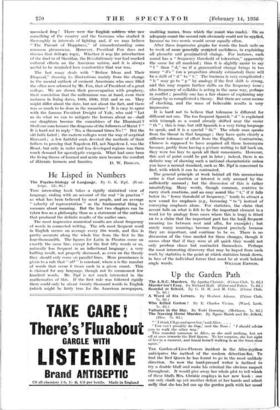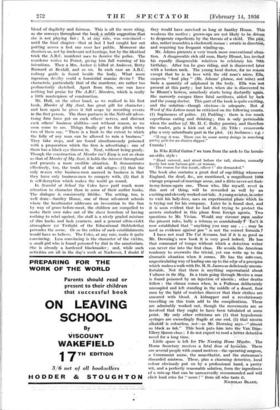Up the Garden Path
The A.R.C. Murders. By Agatha Christie. (Crime Club. 7s. 6cL) Murder isn't Easy. By Richard Hull. (Faber and Faber. 7s. 6d.) Scandal at School. By G. D. H. and M. Cole. (Crime Club. 7s. 6d.)
A Word of Six Letters. By Herbert Adams. (Crime Club. 7s. &I.)
Who Killed Gattcm ? By E. Charles Vivian. (Ward, Lock. 7s. 6d. )
Vultures in the Sky. By Todd Downing: (Methuen. 7s. 6d.) The Nursing Home Murder. By Ngaio Marsh and Dr. Jellett. (Bles. 7s. 6d.)
" I think I'll go and meet-her,' said Alice. . . .
You can't possibly do that,' said the Rose : I should advise you to walk the other way.'
This sounded nonsense to Alice, so she said nothing, but set off at once towards the Red Queen. To her surprise, she lost sight of her in a moment, and found herself walking in at the front-door again."
— -
THE Garden-of-Live-Flowers incident in the ,Alice-irnythos anticipates the. method 'of the modern detection-1bn. To find the Red Queen he has learnt to go in the most unlikely direction. . So now the hard-pressed writer is inclined to try a double bluff and make his criminal the obvious suspect throughout. It would give away her whole plot to tell which of these bluffs Mrs. Christie employs in her new bOok : one can only chalk up yet another defeat at her hands and admit sadly that she has led one up the garden path with her usual blend of duplicity and fairness. This is all the more riling, as she conveys throughout the book subtle suggestiOnAat she is not playing fair ; I, at any rate, was convinced— until the final chapter—that at last I had caught her out putting across a fast one over her public. Moreover she deceives us, not by irrelevant red herrings, but by the identical trick the A.B.C. murderer uses to deceive the police. The murderer writes to Poirot, giving him full warning of his intentions. Then a Mrs. Ascher is killed at Andover, Betty Barnard at Bexhill, and so on. In each case an A.B.C. railway guide is found beside the body, What more ingenious devilry could a homicidal, maniac devise ? The characters, 'particularly that' of the murderer, are rather too perfunctOrily sketched. Apart from this, one can have nothing but praise for The A.B.C. Murders, which is really a little masterpiece of construction.
Mr. Hull, on the other hand, as we realised in his first book, Murder of My Aunt, has great gift for character ; and here again he gives it full scope by recording events in the first person. The three partners in the Ne0-aD adver- tising firm have got on each others' nerves, and distrust each others' business abilities—not without reason, as we soon come to see. Things finally get to the pitch when two of them say, " There is a limit to the extent to which the folly of any man can be allowed to ruin a business." They take steps, and are found simultaneously poisoned with a preparation which the firm is 'advertising : one of them has a black eye thrown in. Neat, without being gaudy. Though the construction of Murder isn't Easy is not so clean as that of Murder of My Aunt, it holds the interest throughout and presents a more credible situation. It demonstrates effectively, too, the truth of the old adages—(1) that the only mason why business-men succeed in business is that they have only business-men to compete with, (2) that it is self-deception which makes the world go round.
In Scandal at School the Coles have paid much more attention to character than in some of their earlier books. The dialogue is consistently lifelike. The setting, too, is well done—Santley House, one of those advanced schools where the headmaster addresses an invocation to the Sun by way of grace-before-meat, the children are compelled to make their own rules out of the sheer boredom of having nothing to rebel against, the staff is a nicely graded mixture of dim hacks and lush yearners, and a general ultra-violet atmosphere (or Twilight of the Educational Shibboleths) pervades the scene. Or so the critics of such establishments would have us believe. The Coles, at any rate, make it quite convincing. Less convincing is the character of the victim, a small girl who is found poisoned by dial in the sanatorium. She is already a hardened blackmailer ; and, while • such activities are all in the day's work at Narkover, I doubt if they would have survived so long at Santley House. This weakens the motive ; grown-ups are not likely to be driven to desperate expedients by the threats of a child. The plot, also, rather resembles a clockwork mouse : erratic in direction, and requiring too frequent winding-up.
Mr. Adams presents a very much more conventional situa- tion. A disagreeable rich old man, Barty Blount, has invited his equally disagreeable relatives to celebrate his 70th birthday. After tea he goes riding, and is discovered later with a broken neck. The young local doctor, for no reason except that he is in love with the old man's niece, Ella, suspects " foul Play " (Mr. Adams' phrase, not: mine) and finds a quantity of sulphonal in the body. Ella was not present at this party, ; but later, when she is discovered to be Blount's heiress, somebody starts being dastardly again.
She narrowly . escapes three fatal accidents, aided by luck and the young doctor. This part of the book is quite exciting, and the -solution—though obvious—is adequate. But A Word of Six Letters must be criticised on the following counts.
(1) Supineness of police: (2) Padding : there is too much superfluous eating and drinking ; this is only .permissible
when the author (cf. Mr. H. C. Bailey passim), and therefore the reader, gets a kick out of it. (3) Title : crosswords play a very subordinate part in the plot. (4) Archness : e.g. :
"Ramp it was. There can be some merry doings in searching pretty girls for an elusive slipper."
Crumbs !
In Who Killed Gallon ? we turn from the arch to the heroic- on-stilts style :
" Head entered, and stood before the tall, slender, normally lovely but now furious girl—or woman.
The reason for this insult, officer ? ' she demanded."
The book also contains a great deal of cap-lifting 'whenever England, the dead, &c., are mentioned, a magnificent 1890 vintage proposal-of-marriage scene, and a ditto never-set-foot- in-my-house-again one. Those who, like myself, revel in this sort of thing, will be rewarded as well by an exciting and cleverly worked-out tale. A young aviator, in order
to visit his ladyflove, uses an experimental plazie-Which lie
is trying out for his company. Later he is found shot, and it is soon evident that he had died trying to protect the
secrets embodied in this plane from foreign agents. Two questions to Mr. Vivian. Would. any coroner even under
the present rules, bully a witness so seandalously- f 'isn't it now established that " anything you may say . . may be used as evidence against you " is not the correct formula ? I have not read The Cat Screams, but if it is as good as Mr. Downing's new book it is very good indeed, He has that command of tempo without which a detection writer can never rise into the first class. He avoids the American tendency to overwrite the trivial, yet can write up to the dramatic situation when it comes. He has the sotto-voce, ungesticulating way of leading one up to the edge of a precipice which makes a walk with Dr. M. R James so deliciously uncom- fortable. Not that there is anything supernatural about Vultures in the Sky. In a train going through Mexico a man is found poisoned by an injection of nicotin ; other deaths follow : the climax comes when, in a Pullman deliberately uncoupled and left standing in the middle of a desert, four
men by the light of matches discover that their clothes are smeared with blood. A kidnapper and, a revolutionary
travelling on this train add to the complications. These are admirably worked out, though the movements are so involved that they ought to have been tabulated at some point. My only other criticisms are (1) that hypodermic syringes are exceedingly fragile at one end, (2) that nicotin alkaloid is colourless, not-as Mr. Downing says—" almost
as black as ink." TIfiri book puts- him into the Van' Diae- Ellery.Queen class ; I do not expect-to read a better detective novel for a long time.
Little space is left for The Nursing Home Murder. The Home Secretary receives a fatal dose of hyOlcine. There are several people with sound motives—the operating surgeon, a Communist nurse, the anaesthetist, and the statesman's discarded mistress. These, plus a charming detective, local colour obviously put on by a professional hand, a pretty wit, and a perfectly reasonable solution, form the ingredients of a mix-up that can be unreservedly recommended and will elicit loud cries for " more ! " from all who taste. it.
NictroLes BLAKE.















































 Previous page
Previous page